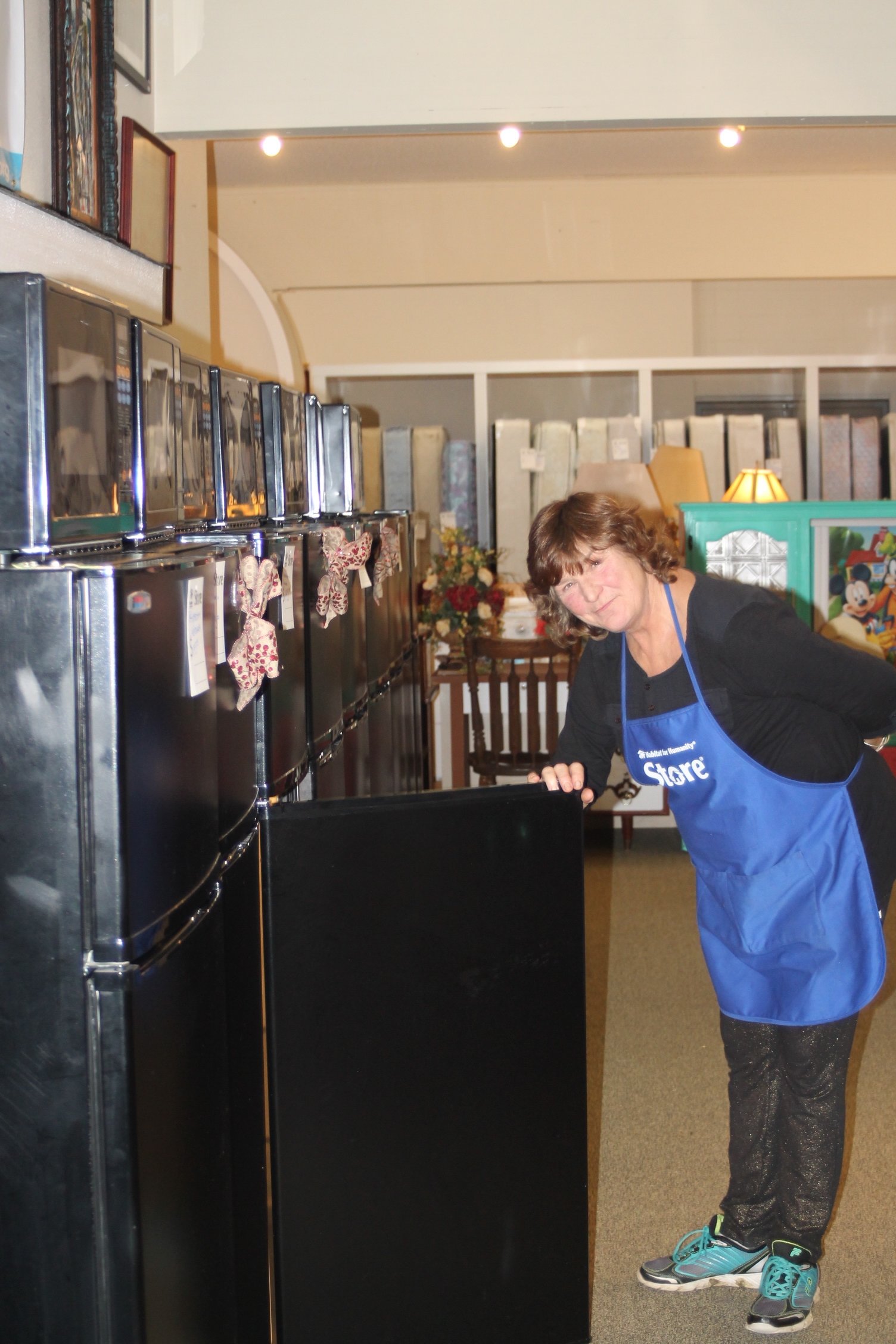If you favor sturdy and sensible furniture and college dorm decor, Island County Habitat for Humanity has some deals for you.
Make that 2,100 deals.
That’s the number of pieces of used, government-issue furniture now available at Habitat’s two island stores, courtesy of a barracks furniture update at Naval Air Station Whidbey Island.
Rows of shiny black refrigerators and stacks of night stands, dressers and captain’s beds were cleaned up and put on sale at Habitat’s stores in Oak Harbor and Freeland. It is the largest single donation to the local nonprofit housing program in its 21-year history, said Brett D’Antonio, executive director of Habitat for Humanity for Island County.
“The whole point was to avoid taking it to the dump,” D’Antonio said. “We’ve diverted 95 tons from ending up in a landfill and we’re able to sell it in order to help build houses.”
It all came from the four-story barracks, known as Building 380, consisting of 163 rooms, each with two sets of matching furniture, a refrigerator, microwave and vacuum cleaner. So many small green upright vacuum cleaners now line the walls at the Oak Harbor store that they look like a squadron lined up for inspection.
At $15 a piece, the hope is the vacuums blow out the door soon.
“We try and price things so they are on the floor for less than 30 days,” D’Antonio said. “So far, the refrigerators are moving the fastest. And the captain’s beds are great for kids or for people without much space.”
The apartment-size black refrigerators come with a matching microwave and sell for $195. Some look barely used. The $225 twin-size platform beds come with a blue mattress, headboard and ample storage space tucked behind four pull-out drawers.
The military barracks booty also includes two-drawer oak nightstands for $30 and fold-down study carrel desks for $165.
DCI Furniture, based in New Hampshire, is coordinating the removal and recycling project at the barracks, which is used as short-term military housing. Its $767,178 contract, providing furniture for the Navy barracks, includes the responsibility of removing furniture when its updated.
The company specializes in durable wood furniture that is sustainably sourced, using mostly oak and maple woods. It contracts with colleges and military bases to provide matching furniture sets that are generally replaced every 12 years, said James Shipley, DCI western states sales and service manager. At several locations across the country, the company has arranged to remove and donate furniture by the truckload to local charitable stores.
“I think we’ve re-purposed about 300 shipping containers worth of furniture in the past three or four years,” Shipley said. “We provide the trucks and the labor. At this barracks building, there’s no elevator so we’re removing windows and using a boom lift.”
Craig and Patti Olson, who have volunteered with Habitat for Humanity for four years, are coordinating the unloading and storage of the seemingly endless flow of furniture into the warehouse at the Oak Harbor store.
“My job is to take it off the truck and figure out where to put it,” Craig Olson said. “But we didn’t have room for 360 captain’s beds so we disassembled 150 of them and the wood is being sold at the Freeland store.”
Olson said he’s impressed not only with the recycling effort made by DCI Furniture but also the hardiness and durability of its products.
“This is exceptional quality furniture,” he said, “I dare you to find similar quality in other used furniture stores.”
Every Habitat for Humanity store differs in what it sells depending on community needs. Oak Harbor loads up on beds, mattresses, vanities and tables for on-the-move military families, while the Freeland store stocks up on wood, tools and other construction items.
Scrubbing and fixing up all the goods that come through the two stores is the task of 90 volunteers.
A new arrival to Oak Harbor from Canada, Georgia Colton, said she chose Habitat for Humanity as her go-to volunteer program as a turn of kindness.
“My sister-in-law had a very bad accident and Habitat for Humanity fixed up her place in Mount Vernon to make it accessible,” she said. “I thought volunteering here would be a great way of saying ‘thank you.’”
The first Habitat for Humanity local chapter started in San Antonio, Texas in 1976. The seed of the idea to build affordable houses for low-income families was planted by Millard and Linda Fuller and biblical scholar and farmer Clarence Jordan. Habitat for Humanity is now in 1,400 communities and 70 countries from Argentina to Zaire. It’s built 70,000 new homes and rehabbed 100,000 houses in the past 40 years.
The Island County chapter is near completion of its 46th and 47th home. The organization employs 13 people, six of them full time. About 3,120 tons of material have been spared from being dumped by being donated and sold at the two Habitat for Humanity home improvement stores, D’Antonio said.
So far, about two floors have been emptied at the Navy barracks, requiring some creative reshuffling of residents as the old stuff makes room for a new generation of shiny and sturdy furniture sets that look the same but have a darker tone of wood.
“It’s been a real pleasure working with that organization,” Shipley said of Island County’s Habitat for Humanity.
“The funds used to sell the furniture help people who couldn’t normally afford a house. It is a great thing to be a part of.”



